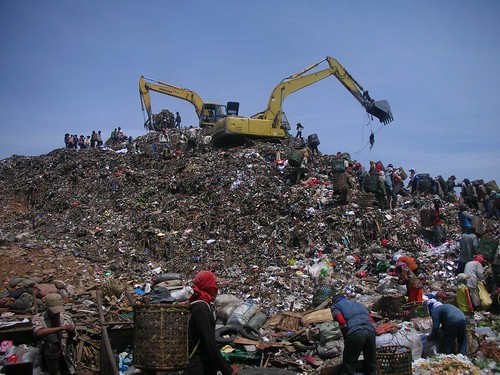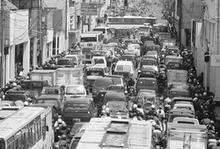Poor Residents Go Green and Generate Income
On April 4, 2008 The Jakarta Post reported a group of young men from a poor neighborhood in Kampung Toplang, Tegal Alur subdistrict in West Jakarta who recycle piles of garbage and make at least Rp. 1 million a month from their green activity. They built a bamboo hut on the field and make compost out of the organic waste and sort the nonorganic waste to be resold. The following link provides the detailed story about that group young men' s green activity:
The Jakarta Post - Kampung Residents Go Green and Make Money
The green activity of the young men from Kampung Toplang provides evidence that poor people can contribute to sustainable urban development. There are at least two contributions of that green activity for sustainable urban development: recycling the organic waste and the reusable nonorganic waste and alleviating poverty.
Waste disposal and poverty are two among many other urban problems that challenge the sustainability of urban development in Indonesian cities, including Jakarta. Neither waste disposal nor poverty is an small problem to address. Waste disposal becomes a pressing and persistent problem in many cities in Indonesia. For instance, the problem associated with the garbage dumping site in Bantargebang is still ongoing issue for Jakarta and Bekasi administrations. The volume of waste in Jakarta is nearly 28,000 cubic meter per day and it is not easy to address.
Similarly, poverty is a persistent problem in Indonesian cities. The National Socioeconomic Survey reported that there were 14.49 million Indonesian poor in 2006 living in urban areas, meaning they live below the poverty line of Rp. 174,290 per capita per month. These poverty lines are still less than the poverty line determined by the World Bank which is $2.00 a day. In Jakarta, many poor city residents resort to living on canal and river banks and were blamed as the cause of the flood. The poor people were accused of dumping the waste into rivers and cause the flood.

Bantargebang, originally uploaded by Neng Dew.
This post is to applaud the green activity by the young men in Kampung Toplang. Recycling the organic waste to produce compost and reselling the reusable nonorganic waste will significantly reduce the waste volume and improve the environmental quality of poor neighborhoods. Such an activity will also generate income for the poor residents and eventually will alleviate poverty in the neighborhood.
Two other things that I need to emphasize in this case are the role of knowledgeable and committed facilitators in initiating the activity and the importance of the support from other residents that make the activity sustainable. Two of the young men in the neighborhood had been working together advocating on behalf of the city's poor and have the knowledge of running a waste recycling business. Both men were able to convince other men in the neighborhood to iniatiate the recycling business and gain support from other residents to recycle their household waste. Without the initiative of the knowledgeable and committed two young men as the facilitators, the neighborhood would stay environmentally and economically poor.
This is a good example of how a community-based green activity works and addresses environmental problems in the slum neighborhoods. This green activity is also a strong case how poor people can contribute to sustainable urban development. That's why such green activity by the young men from Kampung Toplang should be applauded and replicated in other poor neighborhoods in Indonesian cities.




6 comments:
Hello. This post is likeable, and your blog is very interesting, congratulations :-). I will add in my blogroll =). If possible gives a last there on my blog, it is about the Webcam, I hope you enjoy. The address is http://webcam-brasil.blogspot.com. A hug.
The activity in Kampung Toplang is an evidence that usually economic incentives are the drives for recycling and going green.Perhaps if more examples are shown to the public that they can reap the benefit from recycling then we are off the a good start.
your blog has made me believe that indonesia could have a better future if the government is more concerned about the grass root society. i study urban studies in germany and feels the urge to come home and do something there.. i hope my talents and ideas would not go to waste. all success for you...
Nice story as for me. I'd like to read more concerning this matter. Thanks for sharing that data.
Rather interesting place you've got here. Thanks for it. I like such themes and anything connected to this matter. I definitely want to read more soon.
Joan Swenson
Rather nice site you've got here. Thanks the author for it. I like such themes and everything that is connected to them. I definitely want to read more soon.
Kate Hakkinen
Post a Comment